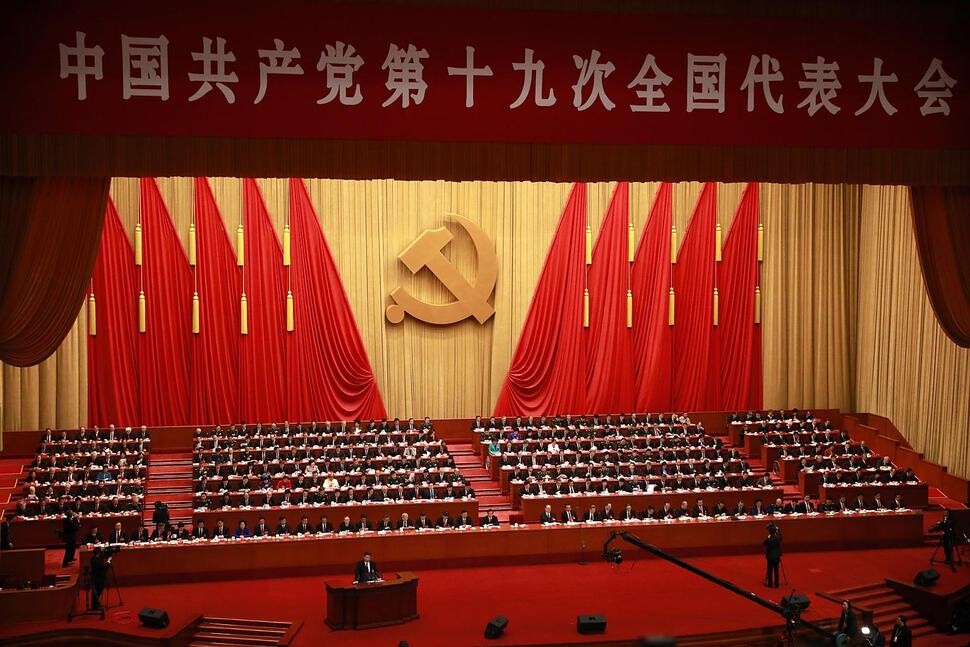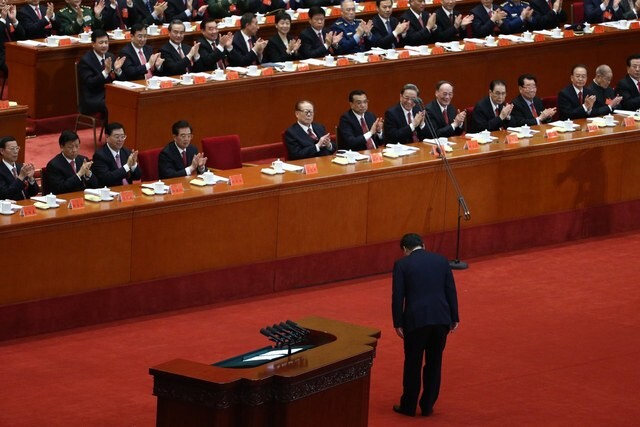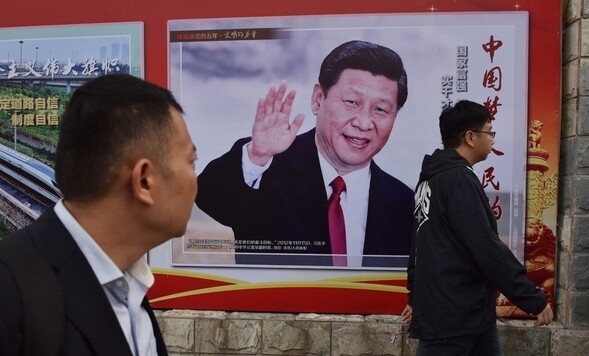hankyoreh
Links to other country sites 다른 나라 사이트 링크
[Editorial] Xi begins second-term with China-SK relations strained by THAAD deployment

Xi Jinping’s second term in office as President of China began on Oct. 18 with the 19th Chinese Communist Party National Congress, which opened the same day. With the event, Xi is expected to hasten efforts to establish a system where he enjoys an utterly free hand. In his opening ceremony speech, Xi presented a vision of China as an “all-around well-off society (全面小康社会).” By this, he meant a society where all citizens enjoy comfortable lives of abundance. He also called for “fighting constantly to achieve the Chinese Dream of a great revival for the Chinese people.”
The international community’s concerns about China stem from the sense that it lacks a sense of responsibility to match its “G2” status as it goes about pursuing a “Chinese Dream” centering on itself. Beijing has shown signs of trying to forge a new global diplomatic order without the US at its center. During the Congress, Xi advocated for a “unique Chinese approach to great power diplomacy.” It’s a process that has led to conflict and clashes with the US and many other countries.

In South Korea’s case, the THAAD deployment issue has it dealing with the worst diplomatic frictions since the two sides established relations. China’s professed “great power diplomacy” approach does not accord with the way it has allowed military and diplomatic issues between the two governments to spiral into a “THAAD retaliation” situation tied to the private sector economy. As far as the North Korean nuclear issue goes, the “great power diplomacy” thing to do would be to stop saying “Why are you asking us to solve the problem?” and take a more active approach to contributing to peace and stability in Northeast Asia.
It’s true that some officials in the South Korean government have been cautiously predicting that relations with China may improve in the wake of the National Congress. The expectation here is that Xi may gain some room to maneuver diplomatically as his domestic standing becomes increasingly cemented. But China views THAAD as an issue that conflicts directly with its own interests and is ushering in changes to the security dynamic in northeast Asia that will mean greater military cooperation by South Korea, the US, and Japan. In that sense, there is no guarantee that South Korea-China relations will improve now that the Congress has been held.
Unlike China, South Korea has little recourse to other methods when it comes to economic issues. If the current strain continues, it could find itself in a situation where it may not recover economically even with improved relations. So there isn’t much time. Seoul needs to commit its energies to diplomatic efforts with Beijing, taking the first step in suggesting ways of mending ties. Since there hasn’t been a South Korea-China summit since President Moon Jae-in took office, holding one might be one starting point.

Please direct questions or comments to [english@hani.co.kr]

Editorial・opinion
![[Editorial] Penalties for airing allegations against Korea’s first lady endanger free press [Editorial] Penalties for airing allegations against Korea’s first lady endanger free press](https://flexible.img.hani.co.kr/flexible/normal/500/300/imgdb/original/2024/0502/1817146398095106.jpg) [Editorial] Penalties for airing allegations against Korea’s first lady endanger free press
[Editorial] Penalties for airing allegations against Korea’s first lady endanger free press![[Editorial] Yoon must halt procurement of SM-3 interceptor missiles [Editorial] Yoon must halt procurement of SM-3 interceptor missiles](https://flexible.img.hani.co.kr/flexible/normal/500/300/imgdb/child/2024/0501/17145495551605_1717145495195344.jpg) [Editorial] Yoon must halt procurement of SM-3 interceptor missiles
[Editorial] Yoon must halt procurement of SM-3 interceptor missiles- [Guest essay] Maybe Korea’s rapid population decline is an opportunity, not a crisis
- [Column] Can Yoon steer diplomacy with Russia, China back on track?
- [Column] Season 2 of special prosecutor probe may be coming to Korea soon
- [Column] Park Geun-hye déjà vu in Yoon Suk-yeol
- [Editorial] New weight of N. Korea’s nuclear threats makes dialogue all the more urgent
- [Guest essay] The real reason Korea’s new right wants to dub Rhee a founding father
- [Column] ‘Choson’: Is it time we start referring to N. Korea in its own terms?
- [Editorial] Japan’s rewriting of history with Korea has gone too far
Most viewed articles
- 160% of young Koreans see no need to have kids after marriage
- 2Presidential office warns of veto in response to opposition passing special counsel probe act
- 3Months and months of overdue wages are pushing migrant workers in Korea into debt
- 4Hybe-Ador dispute shines light on pervasive issues behind K-pop’s tidy facade
- 5Japan says it’s not pressuring Naver to sell Line, but Korean insiders say otherwise
- 6[Reporter’s notebook] In Min’s world, she’s the artist — and NewJeans is her art
- 7[Editorial] Penalties for airing allegations against Korea’s first lady endanger free press
- 8Inside the law for a special counsel probe over a Korean Marine’s death
- 9OECD upgrades Korea’s growth forecast from 2.2% to 2.6%
- 10[Exclusive] Hanshin University deported 22 Uzbeks in manner that felt like abduction, students say